I’ve seen more pitch decks and business plans in the last couple of years than in my life. And, I know what a good pitch deck is, what slides do investors expect, and if a pitch deck is ready for the big presentation.
I spent a week testing the 6 best AI pitch deck generators to see if they can actually get the job done.
I’ve compiled all my research into this article to help you select a tool for your investor presentation.
Disclosure: Irrespective of the fact that I’m associated with one of the AI tools, this review is my honest take on what I liked and what I didn’t.
Testing methodology
I compiled the list of the most talked-about AI pitch deck generators and put them to the test. And to make fair comparisons, I tested all of them with this same business idea:
I even scrolled through verified reviews on G2 and Capterra to identify common user sentiments and challenges.
Now, I didn’t expect AI pitch deck generators to give me investor-ready pitches in one go. But I did evaluate them based on certain baseline criteria:
- Does it create slides that investors expect to see
- How good is the content quality within each slide
- Does the final presentation look visually appealing
- Is the interface easy and intuitive to navigate
6 Best AI pitch deck generators
Before we review the top 6 AI pitch deck generators in detail, here’s a quick table overview:
| Tools | Suitable For | Impressive Feature | Base Price |
|---|---|---|---|
| Startups, advisors, educators & students | AI with comprehensive business planning intelligence | $14 onwards | |
| Designers, marketers & teams | Intuitive control over visuals and even videos | $12.99 onwards | |
| Startups seeking pitch decks | Clunky slides that require a lot of workaround | $7 onwards | |
| Teams & professionals | Visually interactive presentations without professional expertise | $12 onwards | |
| Entrepreneurs & startups | The output doesn’t align with its promise | $10 onwards | |
| Business professionals & presenters | Impressive builder, but lacks advanced editing features | $12 onwards |
1. Upmetrics – For founders who need depth & investor focus
Upmetrics is primarily a business planning tool with an AI pitch deck creator being one of its core offerings.
I offered the same business details we discussed earlier and set up my workspace.
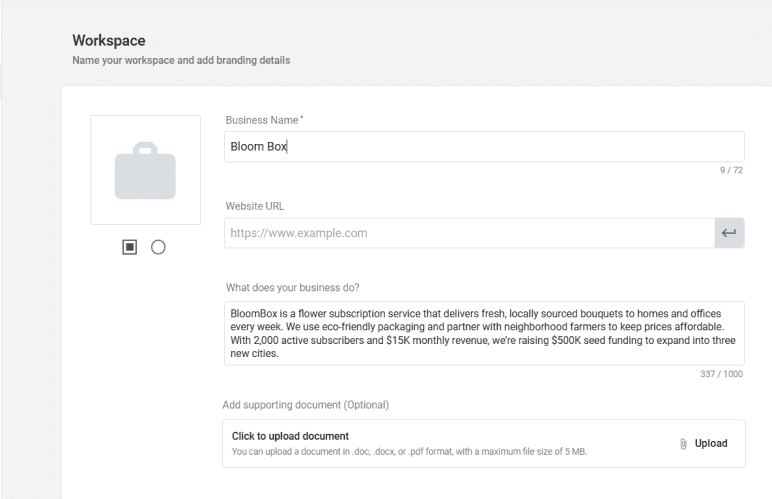
Upmetrics follows a standard structure with 9 predefined slides. These slides cover all the information an investor needs when reviewing your deck.
And while you can approach them in any order, you can’t add any new slides.
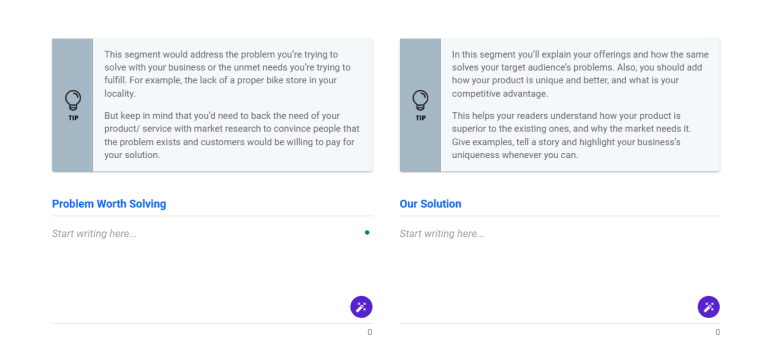
For every question, Upmetrics offered an AI assistant (a little purplish blue icon on the bottom right) to help me fill each section thoughtfully.
I used its auto-write feature to check its writing and see if it makes up information.
Well, it didn’t.
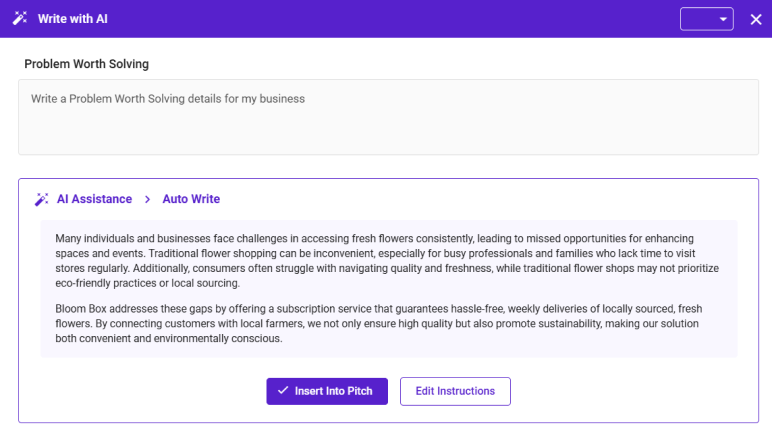
But since the text seemed too heavy for pitch decks, I added custom instructions and got a shorter version in bullets.
Pretty intuitive and useful.
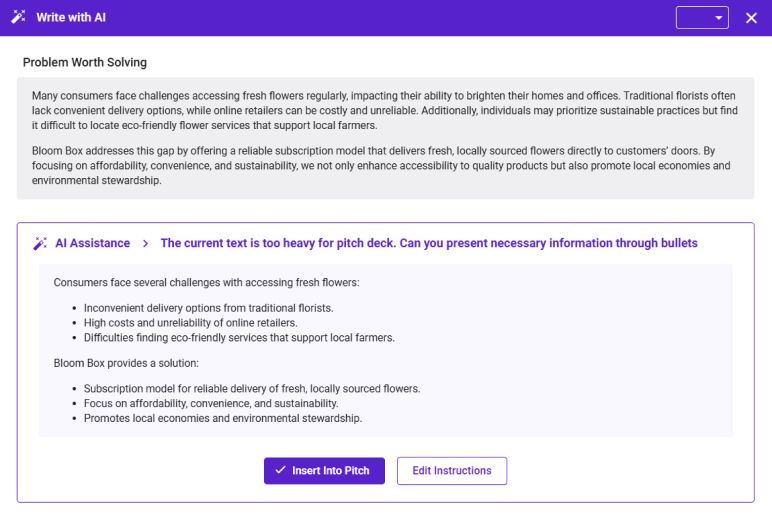
Upmetrics also lets you import data from business plans. If you don’t have a pre-built business plan, it can add dummy data about milestones, traction, and financials. You can then edit those manually with your own research.
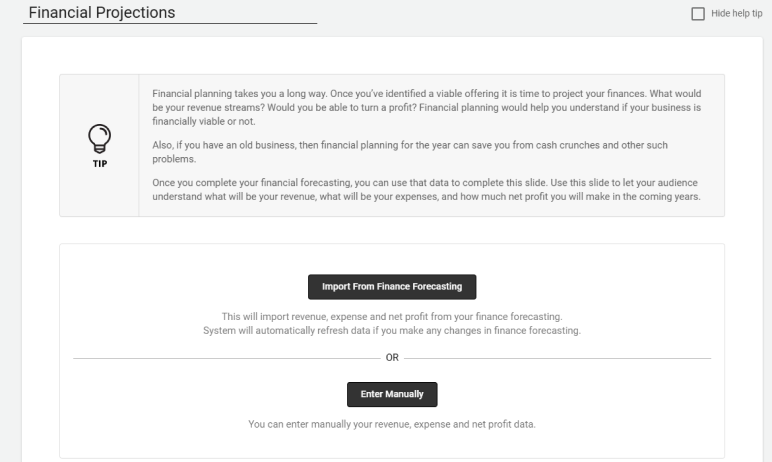
Once you have filled all the slides, you can adjust the font sizes, orientation, and brand colors. You can preview each section and make necessary edits before downloading your final pitch deck.
What I like about Upmetrics is its guided approach. You won’t feel lost figuring out information or financials for your business.
However, it lags behind visually. You don’t get multiple templates, and you can’t generate images or videos with AI.
But if you want the contextual depth that convinces investors of your potential, Upmetrics can be a solid choice.
What stands out: Comprehensive business planning tool that goes beyond just pitch decks
Pros
- Focus on substance and depth rather than beautification
- Pre-designed pitch deck template that includes all essential slides for attracting investors
- Collaboration with team members in real-time
- AI research assistant and AI writing assistant
- Integrates with Xero and QuickBooks
- Access to a library of more than 400 business plan templates
- Can import existing business plan data automatically
Limitations
- You can’t add your own slides or customize the layout
- Doesn’t include an AI image or video generator
Pricing
| Plan | Pricing |
|---|---|
| Premium | $14/month |
| Professional | $37/month |
Prepare Your Pitch Deck in Less than an Hour with Our
AI Pitch Deck Generator
Plan Starts @ $14/mo

2. Canva – For founders who prioritize ease in visual creation
Canva is a name that instantly comes to mind when you think of creating easy yet visually appealing designs. So, of course, I had to include it in this list.
Now, Canva isn’t a dedicated AI pitch deck generator. But it does offer an extensive collection of pre-built templates along with AI functionality to assist you in the process.
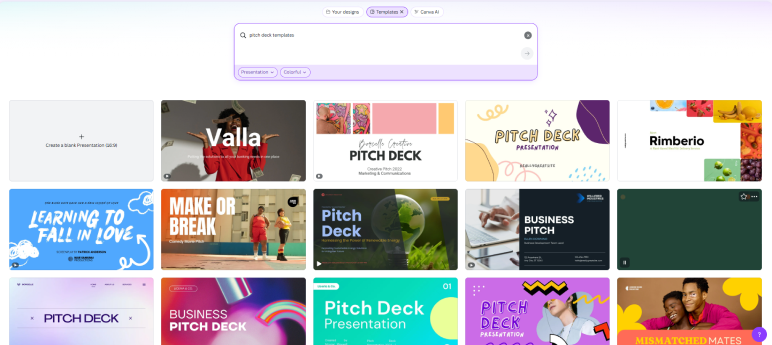
One thing to note here is that Canva doesn’t synthesize your business idea.
You, with your own understanding, fill in the details about problems, solutions, mission, or traction in your pitch deck. The AI assistant will simply refine the language or elaborate on existing ideas.
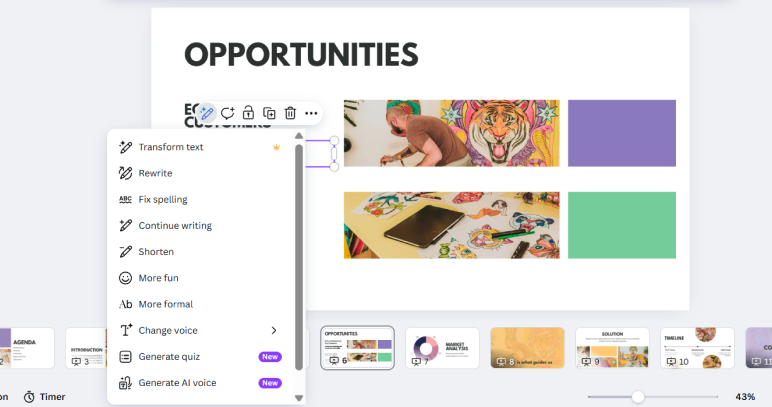
There were quite a few options to rework the existing text. I tried “continue writing,” but the output wasn’t contextual or in line with pitch deck writing styles.
In my opinion, Canva’s AI works best for language touch-ups rather than context building.
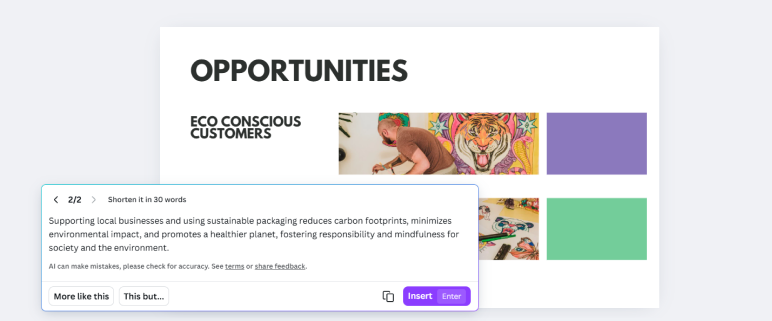
I also tried its ‘Magic Media’ feature to create videos and images for my pitch deck. And while the images were reasonably good, the videos turned out somewhat robotic.
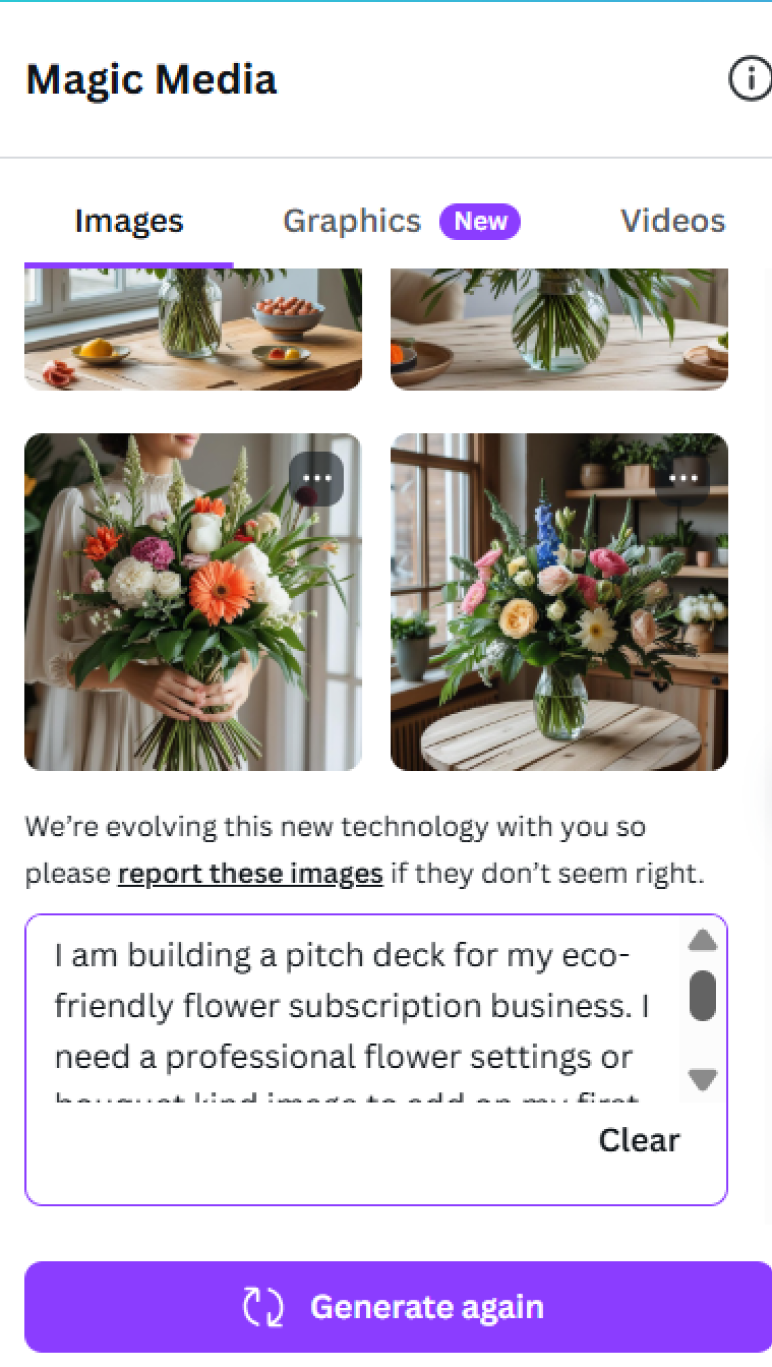
Maybe with more refined prompting, I could have achieved better results. But given that Canva is primarily a graphic design tool, I had higher expectations for its image and video generation capabilities.
What stands out: Most user-friendly interface with an extensive template library
Pros
- AI image and video generation (powered by Google’s VEO 3) capabilities
- AI writing assistance features
- Intuitive drag-and-drop interface
- Extensive functionality within the free plan
Limitations
- Templates may lack investor-specific slide structures
- Limited contextual understanding
- Can’t generate intelligent content suggestions based on your business idea
- Limited credits (on free plan) for generating images and videos with AI
Pricing
| Plan | Pricing |
|---|---|
| Canva Free | $0 |
| Canva Pro | $12.99/month |
| Canva Teams | $14.99/month for one person (min. 3 people) |
| Canva Enterprise | Custom |
3. Slidebean – For budget-conscious founders willing to do heavy editing
Slidebean is easy to get started with. Enter your website or offer a brief company description and wait for AI to build a pitch deck.
I used the same description we discussed earlier to evaluate the depth of content it brings to the slides.
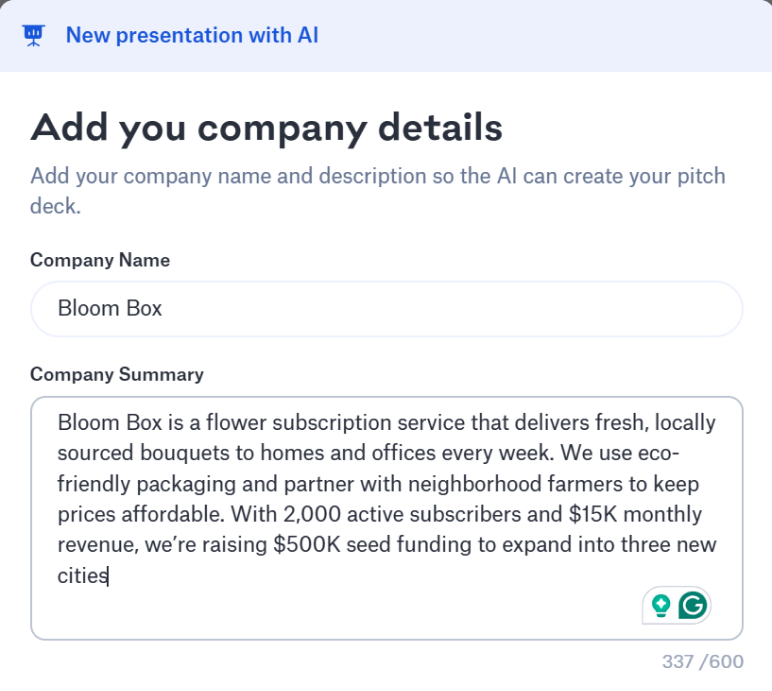
For starters, Slidebean created nearly 13 slides covering all the key information you need while pitching investors.
The slides were overcrowded with text, and the information lacked research. The figures and data were placed as a placeholder for you to verify and fill.
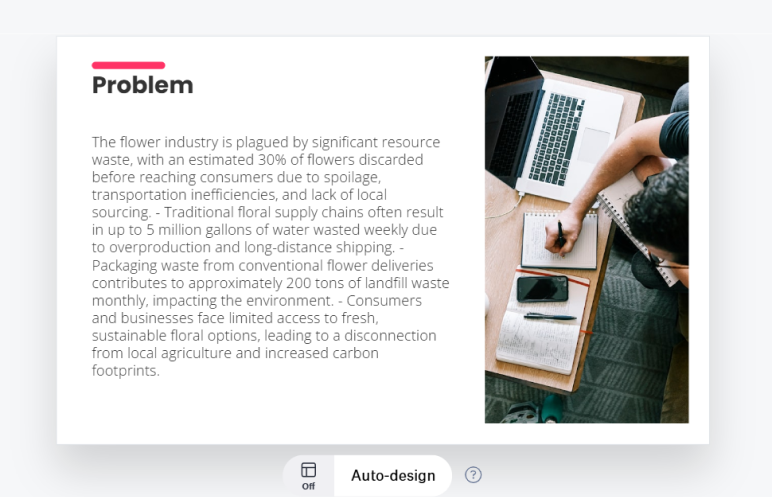
I would have appreciated the AI writing assistance to at least edit or tone-refine the information. But that wasn’t available either in a free or a paid plan.
The visuals also had no resemblance to my business idea. Though there was a free library of images I could source from.

What I liked about Slidebean was its intuitiveness. You almost know what the next step should be without getting lost in endless navigation.
You could adjust the design on the slide by dragging and dropping the content blocks. You can add new tables, charts, graphs, and even embed particular information.
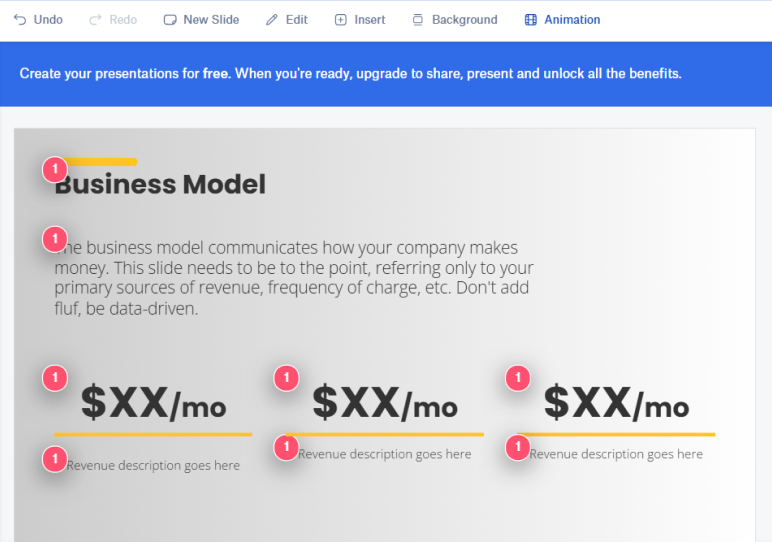
After working on it for around 90 minutes, I had a somewhat usable form of a pitch deck I could present to my stakeholders. Maybe not to the investors.
What stands out: Slide analytics to track views, time spent on each slide, and other key metrics
Pros
- Can try all features for free before paying
- Intuitive content block system
- Good template variety for different industries
- Premium features offer access to the financial modeling bootcamp and investor finder
Limitations
- Images generated by AI rarely match the business context
- No AI writing assistance to improve content
- Slides tend to be overcrowded, requiring significant edits
- Limited customization compared to other tools
Pricing
| Plan | Pricing |
|---|---|
| Starter | $7/month |
| Accelerate | $42/month |
4. Beautiful.ai – Founders who want interactive presentations without design expertise
You need to enter your card details even when testing Beautiful.ai for free. But since it was a tool that’s extensively talked about, I decided to give it a try.
The setup was as simple as other tools: Enter the business details and let AI generate a full-fledged presentation for you.

However, the tool won’t automatically populate details about market analysis, problem statements, solutions, traction metrics, or milestones. You need to provide content (even rough drafts) and then refine it using the AI text generator.
Pretty much how tools focused on visualization work.
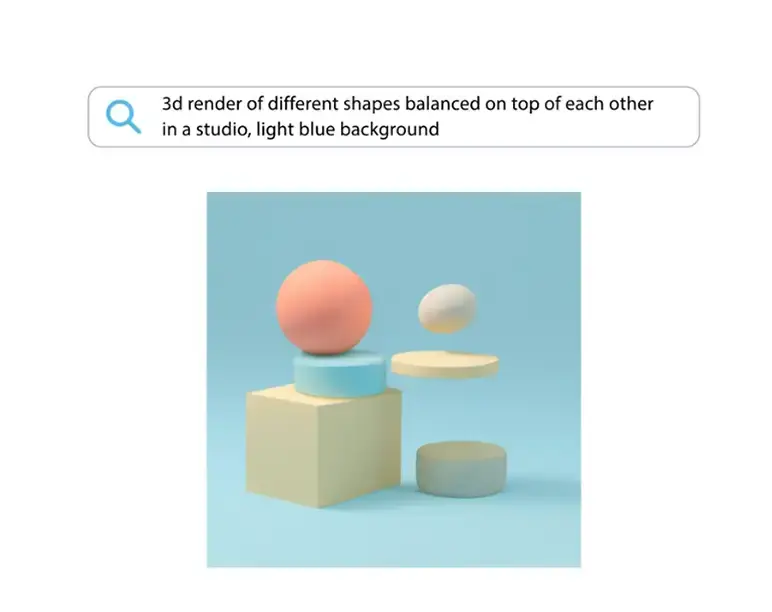
Beautiful.ai features an AI image generator where you describe the visuals you need and watch them materialize.
Its Smart Slides feature automati2cally adjusts similar items on your slide to make them look balanced and well arranged. It’s more intuitive than dragging things to line them up.
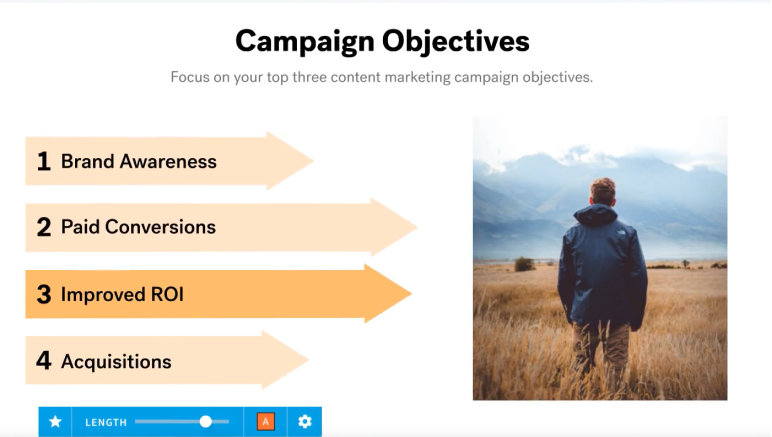
You can edit flowcharts and arrows, and even experiment with different chart types to see which one fits your data type the best. You can highlight points in the graph and make the data visualization prominent.
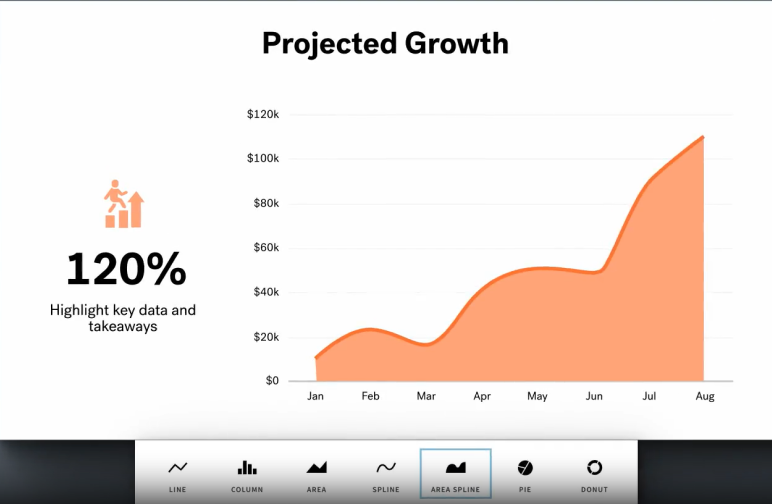
According to me, Beautiful.ai prioritizes visual excellence over contextual depth—but it executes visualization so skillfully that no other tool in this list matches its design capabilities.
What stands out: Smart Slides technology for automatic design balancing
Pros
- Designer Bot for AI-powered slide generation
- Custom branding that can be easily applied to all your future projects
- Collaboration features to work on a pitch deck as a team
- Advanced chart and data visualization tools
Limitations
- Requires a credit card even for a free trial
- Offers little to no assistance in content generation
- Review points towards unsatisfactory customer support
- Team pricing plans per user are extremely expensive
Pricing
| Plan | Pricing |
|---|---|
| Pro | $12/month |
| Team | $40/user/month |
| Enterprise | Custom |
5. Beemer – For early-stage founders with basic pitch needs
Beemer is specifically designed for pitch decks, unlike some tools in the list that fall into the presentation category. So I expected it to create a very nuanced pitch, at least, in terms of context and depth.
Did it meet my expectations?
We will know.
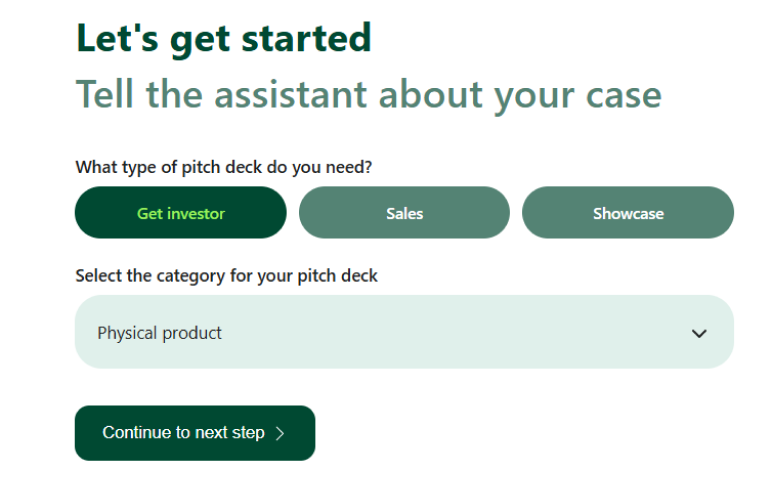
Firstly, the process was pretty intuitive and rooted in pitch deck aspects. It asked me questions about the target market, funding rounds, problem, and the traction—all of which show that the tool knows its purpose.
There were two options to answer the questions: Use AI to draft responses or enter your own content.
I used the AI to answer my question, and the language was not the kind of flattery I expect in a pitch deck.
Also, there were no intuitive controls to refine language or shorten or lengthen the draft with AI.
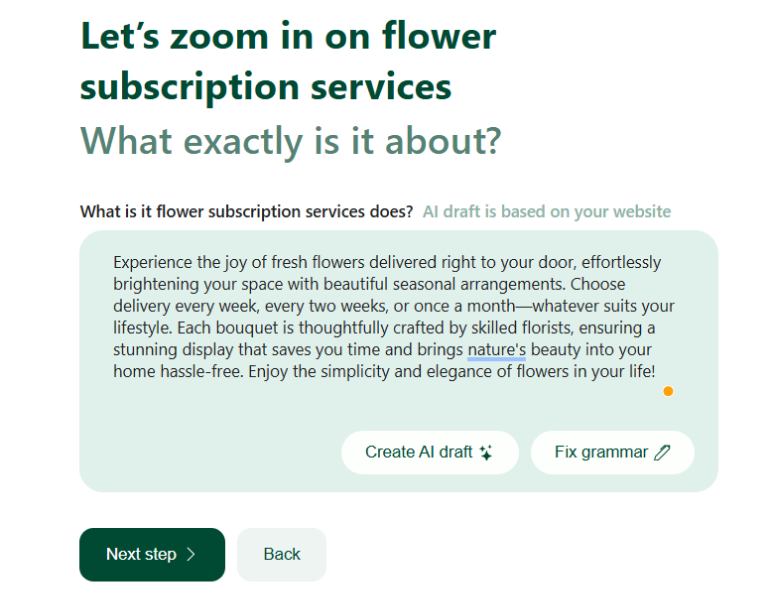
A helpful feature was the progress tracker displayed on the right side while answering questions. It provided reassuring visibility into how the AI was processing my information.
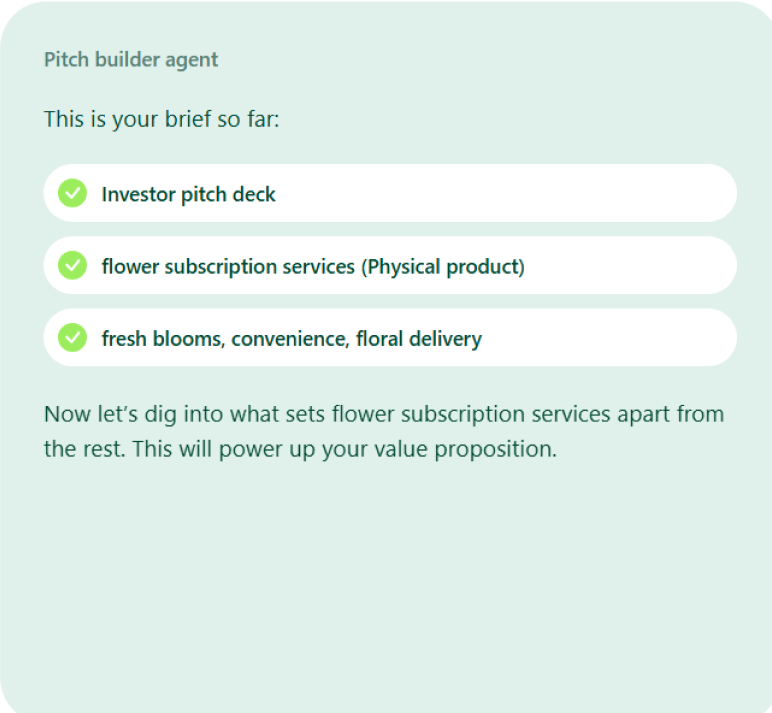
Once completed, you can download your deck as either PowerPoint or Google Slides.
At this stage, I would have greatly appreciated a preview function and editing controls instead of jumping straight to download mode.
And did it disappoint? Yes.
The slides were clunky and completely irrelevant, with images that made literally no sense. I was limited to PPTX functionality to edit my draft, and even after 2 hours, I was nowhere near.

What stands apart: Purpose-built specifically for pitch decks (beta version)
Pros
- Focused questionnaire process for pitch-specific information
- Progress tracker shows AI processing in real-time
- Still in beta, so improvements expected
Limitations
- Can’t make edits before downloading the plan (at least in the free version)
- Lacks of AI capability to generate images or videos
- Clunky content that lacks context, even after thorough detailing
- There’s no option to proceed if you don’t have a website
Pricing
| Plan | Pricing |
|---|---|
| Free | $0 |
| Booster | $10 |
6. PopAI – For founders who value research and depth
After logging in, I was asked to explain my business idea like every other tool.
However, instead of just taking in the information and doing nothing about it, the tool actually populated the slides with real information.
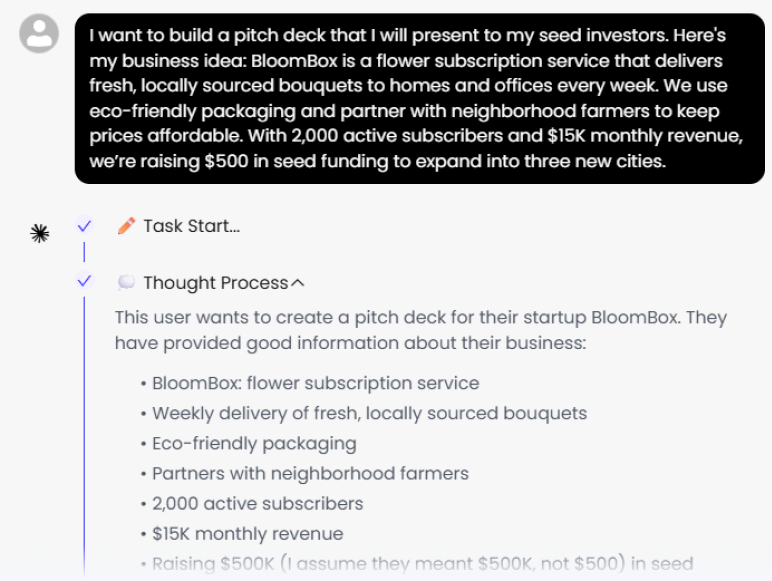
In fact, the tool displayed the entire thought process behind its research and how it found relevant data sources and information about my target audience and competitors.
This was quite refreshing after trying many tools that simply gave me an enhanced version of a pitch deck template.
Now, I think images aren’t a strong forte of this tool. Exhibit A ⬇️
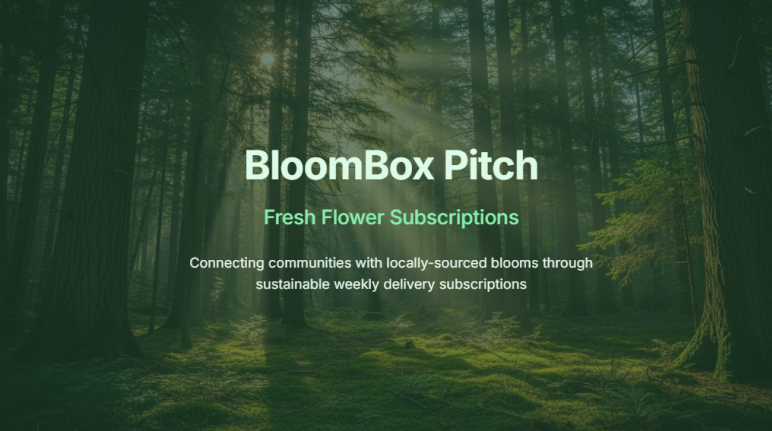
For my flower subscription business, PopAI chose to add a forest background to my first slide 😐.
I did like the content it generated. However, it took me some time to verify the sources and filter out the information.
The free plan (at least) didn’t have intuitive options to make edits to AI-generated slides. I tried customizing the layout and editing inessential slides, but couldn’t figure out a way.
There was also an image generator that uses AI credits to generate images. However, it only offered 1 option instead of 3-4 (like other tools) to choose from.

I don’t think the slides were perfect. But the tool definitely was in my top picks if I had to move with a paid plan.
What stands apart: Shows research process and sources used for content generation
Pros
- One-click sharing capabilities and PPTX export support
- ChatGPT-powered content enhancement and editing suggestions
- Transparent about data sources and research process
Limitations
- Doesn’t allow export in the free plan
- No mention of editing capabilities in feature pages
- Isn’t a collaborative tool
Pricing
| Plan | Pricing |
|---|---|
| Free | $0 |
| Pro | $12/month |
| Unlimited | $47/month |
Concluding thoughts
AI tools aren’t replacements for founder insight—they’re accelerators. Investors care about clarity and traction, not whether you designed your deck in Canva or Upmetrics.
That said, here’s my final call on all these tools:
- Upmetrics strikes me as the most suitable tool. Given that it’s a business planning tool at core, the contextual depth and strategic thinking it brings to pitch decks is unmatched by other tools on this list
- Canva can be a good starting point for stakeholders’ or partners’ presentations. But I won’t try it for investor funding decks
- Slidebean is a miss for me. I can’t spend hours fixing the AI clutter and still end up with a mediocre deck
- Beautiful.ai is definitely a go-to if you need highly interactive and visually rich slides. Though, be prepared to do base-level research for the content
- Skip Beemer. It may turn into a useful creator in the future, but as of now, I won’t recommend it
- PopAI may turn useful with some nudge, but still, there aren’t substantial reviews to back its claims
Prepare your investor pitch decks with Upmetrics
If you’re still here and found this review helpful, I would say take a step forward with Upmetrics. Of course, I have a subtle bias in favor of this tool, but turn to user reviews and you will find it easier to believe me.
With Upmetrics, you get functionality beyond pitch deck creation. This business planning tool is your one-stop for creating business plans, financial projections, strategic plans, and pitch decks. In short, everything that an investor needs.
Sign up now and give your ideas a solid roadmap.

